Qana, Lebanon
I've been watching the Lebanese bloodshed since it started. It really makes
me sick.
I have discussed this with many friends. There was little discussion though:
we all thought this is a plain war against civilian targets. I tried
discussing with people who could maybe be more supportive of the Israeli
points of view. I tried talking to some of my right-winger relatives... and
I haven't been able to find anyone that can say a word of support of what
Israel is doing in Lebanon.
In three weeks, I have seen how Hizbullah killed some Israeli soldiers in
some area around the border between Lebanon and Israel. As far as my (as
an international online paper reader) judgement can tell, the location where
this happened is disputed. Some say it was inside Lebanese territory, the
others say it was an Hizbullah incursion into Israeli soldiers. I really don't
care.
The immediate result of this action was a campaign of air strikes against
Beirut and other Lebanese cities aiming to give a
measured response
(cache,
and beware this is explicit) to Hizbulla's aggression. This, apparently,
included destroying any vital infrastructure in heavily populated areas
of Beirut, including bridges, power plants, hospitals and apparently random
buildings.
While the Israeli army said the military operations were aimed to
get rid of the Hizbullah camps and infrastructures around the border where
they fire their rockets against Haifa and other Israeli cities, and their
headquarters in Beirut and other southern cities, what the world espectated
during the first three or four days of air strikes was pure horror.
Hizbullah-controlled areas were like ghost quarters, so any bombing of those
were very unlikely to take any Hizbullah victims. On the other hand, the
rising number of civilian victims was the first bits of news that I could hear
in my radio as I woke up every morning.
All of this, with a great amount of cinism and unlimitted cruelty. The
Israeli army declared that the civilian population in the South should be
leaving their homes (measured response), while they knew they were
doing exactly what was needed to prevent this, by locking them up around
destroyed bridges, harbours, airport and roads. The first columns of the lucky
refugees who could afford fleeing to the North were greeted by Israeli bombs,
leaving a good number of scattered bodies.
In Spain, the news shocked the public opinion and Zapatero, along with
Chirac (IIRC), declared those actions were untolerable and unproportionate,
and should be stopped immediately. This brought some local politics fun, when
on one side the Israel ambassador in Spain accussed Zapatero of being
antisemitic, and the right-wing leader Rajoy called the thousands of people
who spontaneously demonstrated against the war in a few cities "clowns" and
"ignorant".
Watching what the UN has done to stop these warcrimes, I really think it's
a great moment to shut down that useless organisation and let some big
corporation buy their nice building in New York City to build their offices
in it. Once again, when some countries tried to come up with some resolution
that forced Israel to stop, the United States waived their vetto flag. Once
again, the Security Council has done nothing to put an end to another chapter
of violence in the Middle East. The vettoing powers of some of the members is
so ridiculous that it makes it totally inoperative. So, as the UK and US
governments were not going to do anything to stop the air strikes, Israel had
carte blanche to do whatever they wanted for a week.
And then, Israel's measured response destroyed one of the UN's
buildings in Lebanon, killing four annoying observers, despite their calls
warning that the bombs were falling too near their location. Only then, the
United States decided to send Condie to have a look around the area,
surprise visit to Beirut included.
I wonder, what phone number must the innocent women and children who cannot
escape their cities and towns dial in order to warn the Israeli army about the
proximity of their bombed targets?
After two visits of Condie to the region, nothing has changed, as the
fourth week of operations starts. This is getting on my nerves. I don't, and
won't, justify any of the Hizbullah attacks on civilian targets using
Katyushas, or the kidnapping of soldiers, or whatever. What I see is that
unless Israel takes a radically different approach to their problem, nothing
will change either. Violence isn't at least. Apparently, their military
operation isn't going well at all, and is not damaging much of Hizbullah's
military capacity. What are they going to do? Will they occupy southern
Lebanon for 20 more years?
The social movements this kind of actions are generating is also very, very
worrying. On one hand, I read that around 85% of the Israeli population
approve this war and think this is what their government needs to do to make
them safe. This is pretty shocking. On the other hand, everyone still in
Lebanon, even the Christian community, are united against the attack, helping
each other in their survival quest, while the popular support to Hizbullah
is rising, with big concentrations of people cheering them in the streets.
This is just two years after similar demonstrations in Beirut forced the
Syrian military out of the country.
While the Israeli war against Lebanon (I won't buy the "It's against
Hizbullah" bullshit), sadly all the media, cameras and journalists have given
their back on Gaza, which is under similar, but probably more brutal and
savage military operations by Israel, as another soldier was kidnapped just
one week before all of the Lebanon stuff started. The press doesn't have
any news of how things are going in Gaza. The last thing I remember is that
the UN was warning about the threat of a humanitarian disaster due to the lack
of any kind of supplies in Palestine. If Palestinian kids are starving, the
media are not letting us know.
Yesterday, 54 civilians were killed in an improvised underground bomb
shelter in Qana, most of them being children. The Lebanese civilian death
toll must be well over 500 as of this writing, with a ratio of at least 1:10
compared to Israeli military victims. When will Olmert have enough? The only
way I see this will end up for good is when the Israeli public realises
being at war in three fronts is quite expensive and damages their home
economies. Maybe, at that point, people start hearing what the
Meretz party minority
in the country have been saying for years.
Israel has the right to defend itself. This is the official motto of
Israeli and American leaders. When this right is extended and abused to the
point the main targets and victims are civilians, Israel walks quickly away
from a perdurable solution. Today, hostility against the state of Israel is
even greater than last month. Hizbullah in Lebanon, Hamas in Palestine, will
probably be the winners of the conflict when the bombings end. Not the best
recipe for a peaceful future.
16:26 |
[/life] |
# |
(comments: 38)
Seventy years of the Spanish Civil War and the Spanish Revolution
A few months ago I wrote about the 75th anniversary of the proclamation
of the
Second Spanish Republic
which was celebrated throughout the state. That weekend I visited a fantastic
exposition of Republican and Revolutionary war propaganda posters, in
Segorbe.
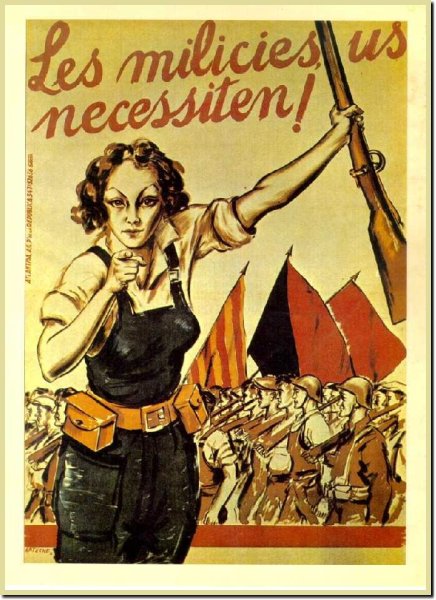
Today, Spain remembers the beginning of the end.
During the evening of the 17th of July and morning of the 18th, a group of
generals of the Spanish regular army raised against the democratically elected
left-wing government of the Republic. History says that the murdering of
Calvo-Sotelo, a right-wing leader, was what finally provoked the conflict.
It was no secret that the same right-wing and some elements in the army had
been conspiring for weeks about an uprise. The only question was when,
but the government was fooled by general Mola and didn't take really effective
measures to prevent it.
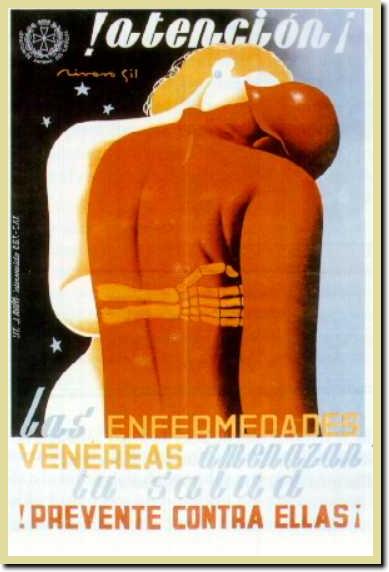
Warning from sanitary authorities against venereal diseases
Mola and Sanjurjo planned to start taking over official buildings and army
quarters and quickly seize control of the major cities. During the first hours
of their rebelion, they managed to take over most of the southern regions in
Andalusia, Extremadura and parts of the Northwest, plus most of the islands
and the Moroccan protectorate area. Meanwhile, the Republic did not manage to
react quickly due to the weakness of the government, and in the first days
of the crisis, the government changed a few times. Finally, the Republican
parties decided that to defend the state they should give arms to the unions,
and soon after many militia groups were getting organised in the cities, and
columns sent off to liberate other towns.
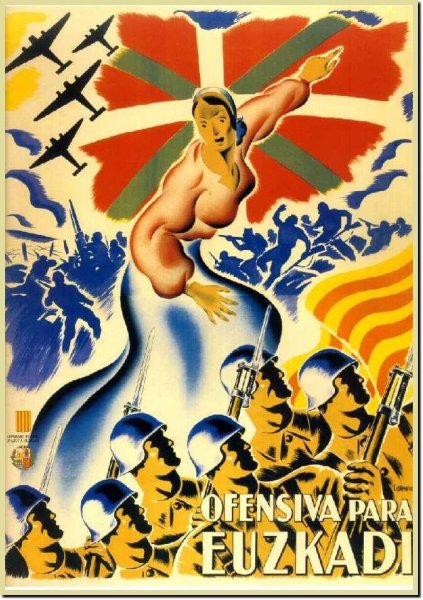
Solidarity of Catalunya to the Basque front
The insurrection was suffocated in Barcelona after some heavy fighting
against the military in the Montjuïc castle; the Anarchists of the
CNT grew strong
in Catalunya and Aragón, and offered good resistance in those fronts.
After the first days of the coupe d'etat, it was clear neither the
legitimate government or the rebels calculated how things would go after the
first days. The government was confident in being able to end the rebelion
as they did four years before; the fascists thought they would have quickly
brought down the government with a successful coup. But after the first week,
the country was divided in two halves, and both sides of the conflict were
keen on fighting, due to the big social fracture during the last months of the
government.
The Republic asked for help to the League of Nations, but the
United Kingdom and France decided not to intervene, scared about the conflict
trespassing the Spanish borders and becoming another bloody war in European
fields. The only official external aid came from the USSR and the
International Brigades,
formed by volunteers of more than 50 nations. Some well-known personalities
like Ernest Hemingway or George Orwell came to aid as well. Orwell wrote about
his life-changing experience in a Barcelona immerse in the social revolution,
where he joined the anti-stalinist socialist party POUM. Badly wounded in the
neck, he left the front and went back to Barcelona, and witnessed the assault
of the Telefònica by the communists against the anarchists, during
the fets de maig, after which the POUM was declared illegal. Orwell
captured his experiences in the frontline and Barcelona in his book
Homage to Catalonia.
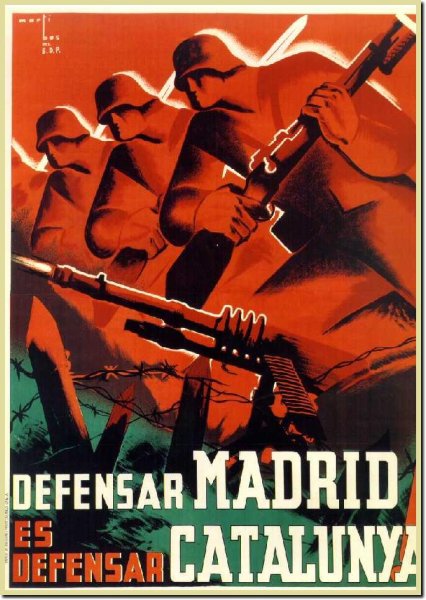
“To defend Madrid is to defend Catalunya”
Franco and Mola, aided by the Northafrican troops and soon after by their
fascist allies of Italy and Germany, didn't have big problems seizing
the Basque Country and Asturies in the North, but not before making the town of
Gernika disappear
below the nazi
Condor Legion bombing,
in what would be a test for the massive aereal bombings of Word War II.
The battle for Madrid was fierce, and the city wasn't occupied until the
very last days of the war. The long defence of the capital made was
immortalised in the famous phrase No pasarán.
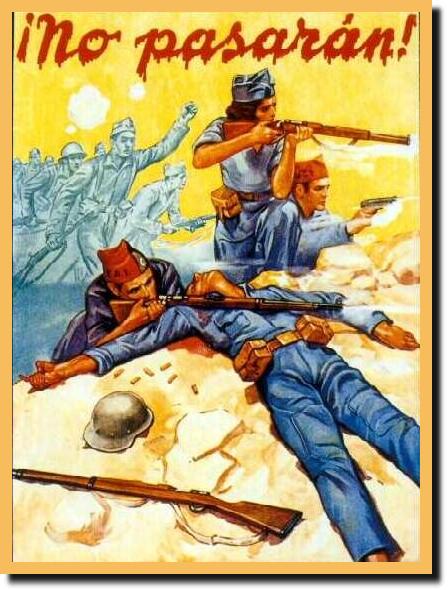
Madrid's “No pasarán”
During the war, anarchist groups controlling fields and towns in Aragón and
Catalunya managed to bring a Social Revolution to the area. The people
collectivised the land and industries, administered by local assemblies. This
experience is regarded as the time when Libertarian Communism has been
successful. The experience ended dramatically when the anarchists were
treasoned and blocked by the communists, and eventually defeated by Franco at
the front.
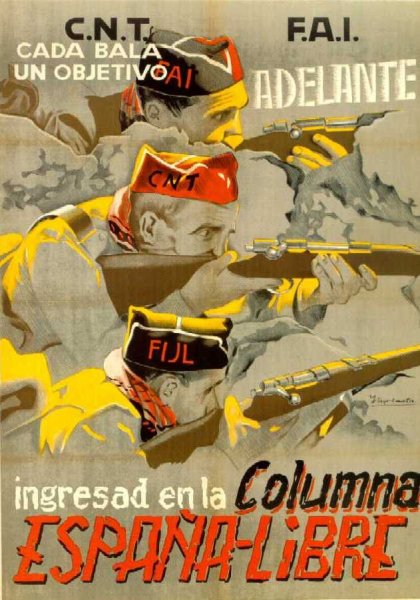
“Each bullet for a target”
After the first and a half years, the fronts had stabilised in Madrid and
the East of Andalusia, until early in 1939, Barcelona fell in Franco's hands,
after the bloody Batalla de l'Ebre, being followed by Girona and the
rest of Catalunya. The fate of the democratic state was clear. Two months
later, Madrid fell and València and the small area still under Republican
control surrended.
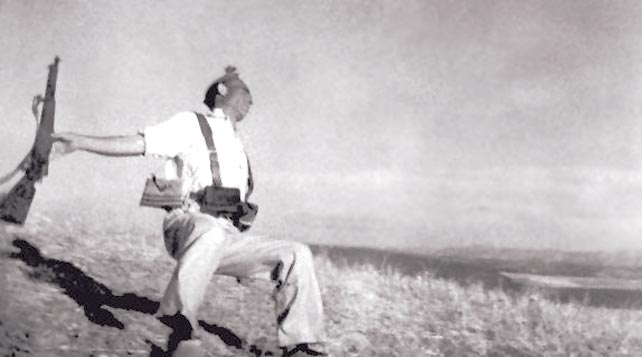
Robert Capa's “Muerte de un miliciano”
Franco declared a totalitarian regime to, according to the fascists,
“reconcile” the two Spains. In the first five years of the regime, up to
100.000 were executed in the franquist repression, including the Catalan
president, Lluís Companys and many intellectuals. The dictatorship continued
executing people until two months before Franco's death, 36 years later.
Hundreds of thousands also had to exile in México, France and other
destinations, leaving Spain in ashes, road gutters full of scattered bodies
and the population facing famine. The cultural elite left the country, making
the state's clock go back at least a decade. Their reconciliation really
meant humiliation and repression. Many people were also murdered during the
war behind republican and rebel lines, but the genocide of the aftermath had
was unmatchable.
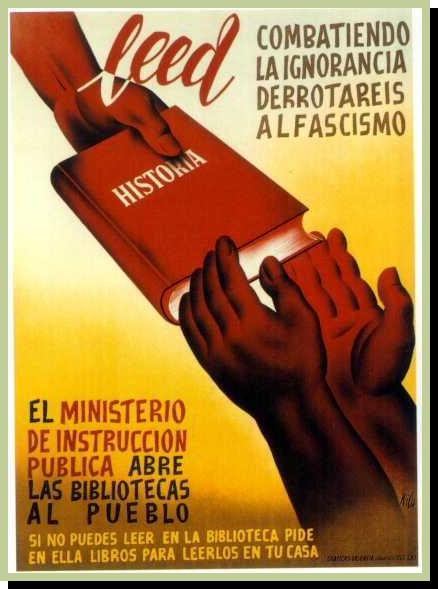
The Republic promoted education among the troups
It is a bit late to restore the dignity of the victims, but not
too late. Some associations have been fighting since the end of
Franco's regime to get some kind of public recognition for their suffering,
for their priceless fight for the legal and democratically elected Republic,
for the people who didn't make it.
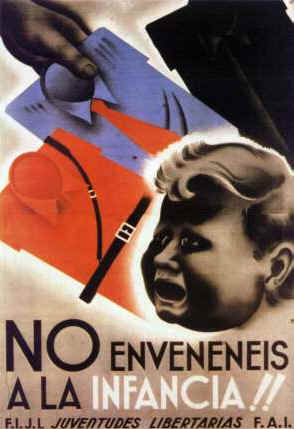
Excellent anarchist poster rejecting the politisation
of children by any of the three loyal groups
Other people reject these efforts banning them of "revisionism". Not too
surprisingly, these are the sons or grandsons of the people who won the war.
The current government is about to pass a “Historic Memory” law which aims to
give recognition to all these people who gave their lives for an ideal and
freedom. Unfortunately, due to pressures from the right, it is probable that
the text will be ammended to make it more acceptable by them. I fear it will
end up not pleasing the victims at all.
I have a passion for Spanish Civil War related matters, and in the last
years I tried to use any opportunity to listen to my Catalan grandmother talk
about war affairs in Barcelona, and my grandfather, from a town in the middle
of the Republican side of the Teruel front, but born in a very catholic family,
about how the war went on in Vall and the nearby mountains.
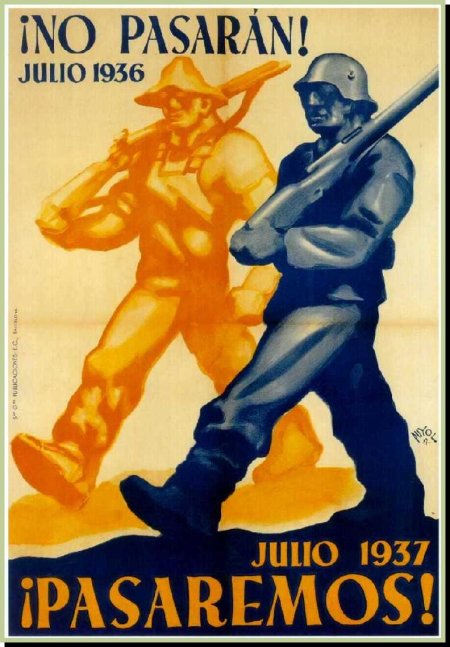
From the defensive “No pasarán” to the encouraging “¡Pasaremos!”
I know my grandfather only told me the less compromising stories, like how
he was sent to dig refuges until he was 16 and apt to fight in the Front, or
how he was put in charge of hiding the church's valuable relics in a few
barns. He never told me about how life was after the war in the small town.
It is dramatic to see that all the people who were old enough to have a sense
of what was going on at the time are so old that these unvaluable memories and
stories will be mostly gone in ten years.
(Most of the pictures are taken from the
Sociedad Benéfica de Historiadores Aficionados y Creadores'
website, which has a huge documented catalog)
19:07 |
[/life] |
# |
(comments: 8)
New SMS received
Message 1
I am in Spain!
What a fine country.
+1310XXXXXXX
2006/07/16 18:10:18
Dear sender,
I'm happy about you being so enthusiastic about your visit to Spain.
I would probably be able to share the moment with you if I had the slightest
clue about your identity.
Have a great night at nearly 30°C,
Jordi
00:27 |
[/stuff] |
# |
(comments: 3)
Bétera 2006
For most of the past winter I've been trying my best to get back into a
somewhat regular schedule of training. I have failed miserably.
At most, I've managed to go swimming at 7AM once or twice a week with
my teammate Rafa, but I've been quite irregular. I also tried getting some
running done, which revealed my condition is the worse in the last 7 years,
probably. The first days I went running I felt I couldn't go faster than
4.5 mins/km without having my legs warn me about what I was doing. It was
horrible. And when I started to get into the habit, I had to stop.
I started getting some pain in both knees whenever I ran more than 45/50
minutes, and I associated it to my weird knee “crack” I get after a while
of cycling. So, in March or so, I decided to stop, frightened of the pain
being a serious injury or something.
I wanted to visit a physiotherapist as soon as possible, but that only
happened a few months later. I visited my teammate Jordi Reig in Alcoi, and
after exploration, he deducted my knee problems probably come from the
massive contractures in both quadriceps.
I was meant to start running again, adding minutes to the sessions
progressively until reaching the problematic 50 minutes of pain. I've been
so busy though, that I haven't been able to do anything in the last months,
so I can't say how bad my quadriceps are now.
Two weeks ago, during the WarmUp Weekend in Vilanova, I got a bad kick on
my calf during the semifinals game, and the day after even walking was
painful. I had already signed up for the Bétera triathlon, so I thought I
may not be able to finish it.
I signed up as I did with other competitions last year, with the goal of
finishing and nothing more. This time, all my cycling training was a 40km
stage I did back in December. Bétera is a sprint with swimming
done in a 50m pool, 27kms of cycling in an irregular circuit and a bit more
of 5kms of running around the town. It is organised by our team mate Jordi
Jordà, and this year was the second edition. I already attended last year.
On Sunday, I had to wake up at 6:10AM after going to bed at 3 or so, had
some chaotic breakfast and drove up to Bétera. This year I haven't got a
triathlon licence, so I was in the teamless and veteran people leg.
The judges made us wait in the water for nearly half an hour, apparently
because one team was missing and was about to arrive. They could have warned
and I wouldn't have frozen in there. The people in my lane tried to organise
the start of the race, in order of what people said they swam. As the older
people claimed they swam in 14m or so, and I had no idea of how much I would
do, I offered to go last.
Ok, that was a fuckup. It seems the 4 guys immediately before me weren't
exactly van den Hoogenband or Phelps. After the first 100 metres I got tired
of swimming at half speed and decidedd to overcome a few of them. I managed
to get rid of two on the 350, but when I tried with the third, he didn't seem
too cooperate too much, so when there were just 200 metres left I decided to
not waste more energy on that. My swimming time wasn't spectacular, but at
least I got out without being tired at all.
Cycling made me remember my biggest problem when there's some climbing
in the circuit. I climb very well, but everything you climb you'll have
to descend eventually. So the three laps were the same: I passed many people
on the way up, but on our way down they would go past me again like rockets,
due to my minimal body weight. That sucks.
At this point, I thought I would have abandoned the race due to my calf
injury, but as I was feeling more or less ok, I decided to give it a try.
The first lap of two wasn't so good, I felt my legs weren't used to the
transitions, but after they warmed up a bit I started running faster. Until,
1.5kms away from the end, the quadriceps started warning me; I had to slow
down again until I crossed the finish line.
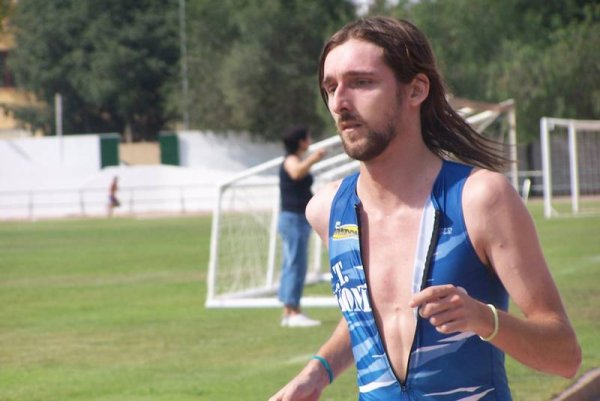
I would look more like an athlete if I shaved...
The rest of the team did pretty well on their leg, specially Rubén who
came in third after having raced on Friday night. A few hours and many
children races later, we received the team award for the
Komando's second place.
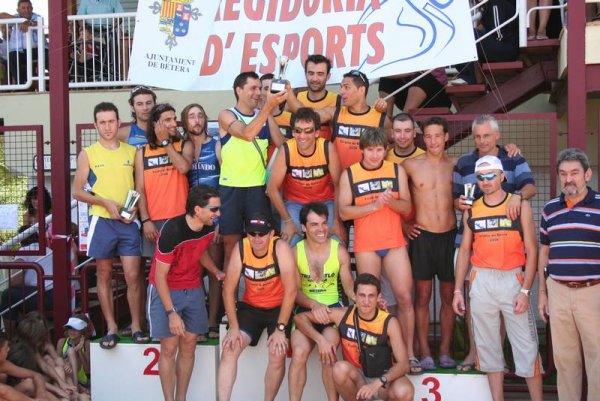
Everyone loves the Komando. Go Komando!
It always feels good to do races like Bétera. I plan doing a few more races
this summer: València, Pinedo, maybe Antella, maybe Cuenca...
17:22 |
[/triathlon] |
# |
(comments: 0)
Jo no t'espere
Not at all!
The Pope is visiting València next weekend. According to Rita Barberá Noya,
the mayor of the city during the last 16 years (I mildly remember her
predecessor), “All Valencians will welcome him warmly”. Well, not exactly
all.
The Pope's visit was decided by the previous one a few years ago, and
Ratzinger, shortly after being “elected” his successor, announced he would
still visit València for the World Meeting of the Family.
In principle, I would have no problems with him come visit the city, even if
I have no sympathy at all towards his figure or the role of the Catholic
church either in Spain or other places of the world. For example, I think the
last two popes are direct responsables for the AIDS drama in many countries of
the African continent. It is unacceptable and quite unethical that still today,
after decades of fight against this deadly plage, the Vatican keep saying “no”
to the usage of condoms.
As I said, I would have no problems with his visit, if it was a normal
visit. But no, this is the València, and the government likes to show
that they can do things in a grand way. Not so long ago, Ratzinger visited
Poland, and from what I've read, the authorities there didn't organise
anything grotesque like what's going on here, in the sense that people living
in the areas affected could more or less keep on with their lives, and the
visit didn't cost much of their tax money.
València won't work like this. Anyone who has visited us will probably know
what I mean: the Ciutat de les Arts i les Ciències, Terra Mítica, the America's
Cup harbour... are examples of pharaonic projects, all funded with public
money that are real black holes of budgets that never end up growing.
The Pope will stay in València around 24 hours, and will give a series of
sermons and speeches. For the ocassion, the Valencian local government has
gone all the way to make his visit the most spectacular event of the
decade. Although the government won't disclose it officially, the press talks
about a cost of 30 or 40 million Euros, paid by all of us, including atheists,
agnostics or muslims.
Spain is not a catholic state, officially. Sadly, it is in practice.
According to Vatican sources, 94% of Spaniards are catholic. The number goes
down to 76.1% according to
CIS, but the
reality is that just a small fraction of these people are practising catholics.
The Spanish church uses these figures to get funds from the state. I am
included in that 76% just because I was baptised soon after I was born. There
are people trying to apostatise, but it
seems in most cases their efforts are futile, as the documentation sent to
the eclesiastic authorities is either ignored or sent back with a hilarious
excuse such as “your baptism is a historic event and cannot be changed”.
Parts of València have been closed to transit for two months. This is
because the authorities found that the optimal place to build his giant altar
with a special microclimate was on top of the bridge of Mont Olivet, one of
the arteries of south València if you want to leave the city. The neighbours
of the area now popularly called "ground zero" have been subject to all kind
of annoyances: the access to their houses is restricted, they've had to give
lists of people living in each place, and they are now not allowed to use
the upper terraces of their buildings (they are taken by snippers).
The local police has designed a
plan to restrict any kind of transit
that affects basically half of the city, even my area which is like 6
kilometres away from the event.
For months, our authorities have used this great opportunity to make
religion and the greatness of our pope something normal and quotidian. I
haven't seen such a big interference of my life by the church before, not
even with the Aznar government, or when I was a small child and the
dictatorship had just ended. They are also using the event to promote the
achivements of the right-wing local government (via speeches and the propaganda
that is distributed in the backpacks given to volunteers) and to bash the
socialist central government (which recently approved gay marriage, a new
education law that weakens the weight of religion study in public schools,
etc.).
I could go on and on, but this rant would get even more boring. I, like
many others, think that all of this is not acceptable. As we tend to not shut
up when things like these happen, a civic movement appeared two months ago,
with a main goal of letting people know that we are not waiting for him,
contrary to what the mayor says. The
Jo no t'espere campaign has managed
to make opposition to this pompous week by placing banners on balconies. Of
course, I have my own, and I've also distributed a few more among my
friends, one of them being placed a mere 70 metres away from the pope's
altar.
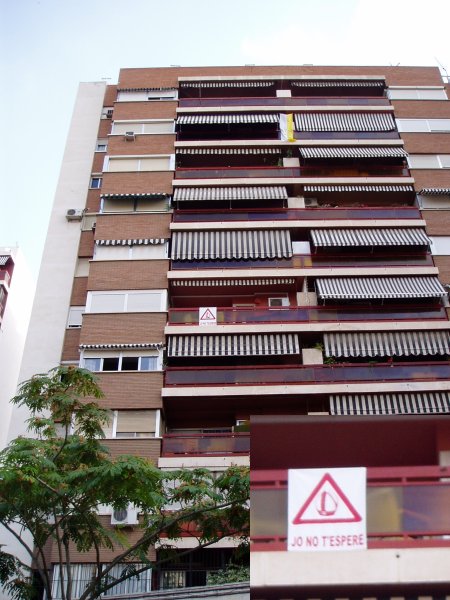
No, jo tampoc t'espere
Of course, the amount of Vatican flags outnumbers us greatly, in a ratio of
at least 1:100, but anyway. There are so many Vatican flags that this looks
more like St. Peter's Square. Others have taken the opportunity to exhibit
Spanish flags all over the place, something that probably had not happened
in València since the most obscure years of Franquism. Oh well, this is
València.
One piece of good news: due the chaos starting in just two hours, we're
allowed to leave offices early today, so we can actually get back home.
As soon as I get home and have lunch, I'll flee away to the mountains, like
a maqui until the madness is over. The 1.5 million pilgrims can
have my holy city. Have a
nice time, Ratzinger!
11:50 |
[/life] |
# |
(comments: 18)
Metro crash in València
As most of you know already, there was a horrible accident in the Línia 1
of the Metrovalencia underway system of València, where I live. The death
toll is, as of this writing, 41, and several more people are in critical
condition in the hospitals.
Thanks to the many people who mailed, texted and msgd me on IRC to find
out about my status. I am ok, as are my closest relatives and friends.
The causes for the accident are not clear yet, but officials say the
southbound train, one of the oldest in the system and in service for 20
years, derailed due to an excess of speed in one of the bends of the tunnel,
next to the Jesús station, after one of the iron wheels broke. The
crash must have been very violent, as the number of dead has always been
quite higher than the injured.
With these numbers, in a not so big city as València, you're sure to learn
about the luck of people you know. In my case, one of my best friends Sabrina
escaped the accident thanks to her stubborness. She had to go to the
Hospital Peset a few minutes before the time of the crash, and although her
two workmates were taking the Metro, she decided to cycle alone, avoiding
taking the deadly train. Her two workmates are, luckily, only injured; one
of them was being shown on the very early TV foootage, as she was carried
on a stretcher to an ambulance. The only information I have is that one
arrived in the hospital unconscious, the other needed leg surgery due to the
wounds. I think they weren't among the very grave.
TV stations have been missinforming about the status of the Metro system
in València. The reality is that the Line 1 has been in service for 20 years,
and I've been a user for at least 17, as it's the only one which connects
Godella, where my father lives, and València. I've seen the infrastructure go
from brand new to it's current despicable state. There are trains which are
as old as the line itself, and others which are even older, as they were in
use in an older, now taken over by Metrovalencia, train service which
connected several towns with the North and South of the city. For more than a
decade, the effort to modernise Line 1 have been inexistant, other than
prettifying the old trains to make them look more like the new models in
lines 3 and 5.
The railroad Unions of Metrovalencia have been denouncing the state of the
infrastructure for several years, and the local government had finally
announced a massive replacement of trains for later this year. Just a bit
too late. I'm getting ready for the official reports making the train driver
the only responsible, though. Valencians are getting used to this kind of
deluding.
The needed investments for other “equally important” matters in this city,
like the America's Cup or the imminent visit of Pope Ratzinger next weekend
have not been delayed for years, though.
12:20 |
[/life] |
# |
(comments: 10)

















